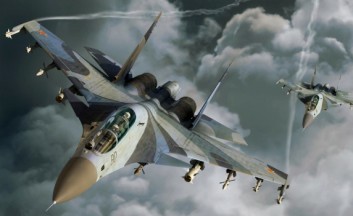Lukashenko finds new ways to delay negotiations with the Kremlin
 The situation has not changed
The situation has not changed

On April 26th, while talking to reporters, President Lukashenko stated that so far the issue of opening a Russian airbase in Belarus was not discussed, but only the supply of Russian fighter jets and S-300 missiles.
In the coming two years, Lukashenko’s the only political goal is to maintain and strengthen his role as a non-alternative mediator in the negotiations with Russia. Simultaneously, domestically he needs to keep up his positions as a leader, who is autonomous and independent from the Kremlin.
Lukashenko’s statement was intended to clarify and partially refute another statement made on April 23rd by Russian Defense Minister Sergei Shoigu in Minsk. During the meeting with Lukashenko, he said that in 2013, it was planned to create a commander and post-duty unit for fighter jets in the Belarusian military and by 2015 Russian aviation regiment would be deployed to Belarus.
Since the talks are about the airbase, this information should be treated critically. However, the negative response to the news about the airbase, forced President Lukashenko to react and to say that Russian fighter jets and S-300 supply was primarily for the Belarusian army needs. But Lukashenko de facto has not denied the possibility for the Russian airbase in Belarus.
Military cooperation with Russia objectively creates a negotiating base for President Lukashenko, which he would like to use to mitigate or delay Belarusian state property privatization. Besides, Belarus is preparing for the elections (local elections in 2013-2014 and presidential elections in 2015), which forces Lukashenko to look for new ‘trump cards’ in negotiations with Russia and to demonstrate the inevitability of his candidacy for the country.
It is very likely that the Shoigu’s statement on April 23rd about plans to establish an airbase – to which Lukashenko has silently agreed – really was a result of some kind of negotiations. It is also very likely that President Lukashenko will delay the negotiations for the aircrafts’ supply or about the airbase deployment, which is clear from his recent statement on April 26th.
To delay the negotiations, Lukashenko will probably use the Belarus’ sovereignty argument, as well as the opposition potential to demonstrate the ‘people’s rage’. If the situation is favourable for the Belarusian authorities, the negotiations about the state property privatization and the Russian airbase deployment will be postponed until the 2015 elections. At the same time, Lukashenko will retain his status as the only guarantor of fulfillment or non-fulfillment of agreements by Belarus, which eventually will help him to retain and enhance his domestic political authority.
Subscribe to our newsletter




Situation in Belarus
Constitutional referendum: main consequences


 Video
Video
How to count the political prisoners: are the new criteria needed?


 Video
Video
Paternalism In Decline, Belarusian Euroscepticism, And The Influence Of Russia


 Video
Video












